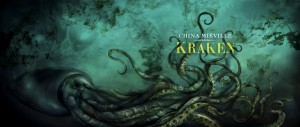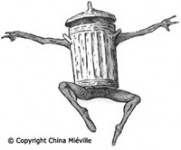Five of the books I read in May were by Neil Gaiman. Three of them were comic book collections, so those are a quicker read, usually. But still – that’s a lot of Gaiman. And that doesn’t include the months (and months) of blog posts I read. Plus, he’s the reason I read Alabaster. So, yeah.
He shows up a lot in June as well. And July. He’s a talented, prolific guy, what can I say?
***
Absolute Death & Endless Nights and Marvel 1602, all by Neil Gaiman and various artists (Dave McKean, Mark Buckingham, P. Craig Russell & Andy Kubert to name a few). Reading these reminded me of how much I loved reading comics. Not as a kid, as an adult. I got hooked on X-Men comics the summer after I graduated from high school (my roommate had been collecting for years and I got to read all he had, and then had to start collecting my own when I moved away). I finally stopped collecting them after 10 years – not because I stopped liking them, but because it was too expensive to keep up with all the storylines I was interested in, too much work to make sure I didn’t miss anything, and they are much more fragile than books. Plus, I was a broke child and had to economize. But I never stopped liking them. I got all of these at the library – yay, libraries with graphic novels!
Absolute Death* & Endless Nights are both oversized collections from the Sandman comic book series. Death is the incarnation of death (a happy young goth girl) who is one of the Endless, a group of immortals (but not exactly) which includes Dream, Destruction, Desire, Delirium (formerly Delight), Destiny and Despair. Absolute Death is a collection of the Sandman stories that Death starred in, and Endless Nights has one story about each of the Endless. Both include forwards, extra text/sketches/back story/etc not included in the original comics. Much awesomeness.
Marvel 1602 is that most perfect of things: A COMIC BOOK by NEIL GAIMAN that has the X-MEN in it. Plus the Fantastic Four, Nick Cage, Captain America, Dr. Strange, and a bunch of other Marvel Universe regulars I’ve forgotten. Mutants start showing up in the year 1602, and prehistory starts repeating itself, sort of. It’s fantastic. A 6-comic series that ended up being 8 because there wasn’t enough room for it all. Even more awesomeness.
American Gods and Anansi Boys. I read American Gods (again) for #1b1t on twitter – in fact I joined twitter so I could follow it. #1b1t was the first twitter book club (one book one twitter). Twitterers voted on what book the world should read – and American Gods won. I read Anansi Boys (again) because I was reading the part of Gaiman’s blog where he was writing it – and wanted to give it another shot.
American Gods is a fabulous book, probably the novel that moved me from liking Gaiman’s writing to looooving it (I’d already read Neverwhere, Stardust and Smoke and Mirrors). It is the story of Shadow, a seemingly-regular-joe who got in a bit of trouble, and gets out of jail to find that ancient gods (like Odin and Icarus and hundreds of others) are battling new gods (like Media and Techboy), and he’s caught in the middle. A road story, and buddy story, a coming-of-age story, and a treatise on the waves of peoples who have come to the ‘new world.’ Also about human nature, and faith. Did I say I loved it? LOVED it. I think I first read it in 2002ish when it first came out in paperback. This was probably my fifth time – still fantastic. Couldn’t stick to the reading schedule for #1b1t and finished it the 3rd week.
Anansi Boys is… well, my least favorite Gaiman book (see, my love is not blind!). To be fair, the first time I read it, I thought it was a sequel to AG, which it most definitely is not. It shares one minor character in a completely different context. This book is a comic (as in funny, not as in pictures + word balloons) undertaking, whereas AG is a serious and contemplative novel. Not that there’s anything wrong with that. But it’s like when the movie trailer looks like a romantic comedy and the film turns out to be gory horror flick – it messes everything up. So I was reading it again to give it a fair shot (and this time prefaced by Gaiman’s blog discussion). Still my least favorite Gaiman, but I liked it better the second time around. AG is my favorite kind of novel, and very well-done. AB… isn’t. My favorite kind of novel, that is. It is very well-done.
For those of you sick to death of me blogging (and talking, and texting, and facebooking) about Mr. Gaiman – you’ll be happy to hear that I only have about 18 12 months of blog left to read. Then I will have Read. It. All.
Well, all except the American Gods blog – which is in a book w/some other stuff, so I’ll be reading it there when I can get a copy. But I have to warn you… he’s still blogging. And writing. And twittering. And now I’m following his fiance and his assistant because they are both funny and interesting as well (no, Officer, I was not peaking into Mr. Gaiman’s windows. These binoculars? I was merely admiring those fine bee-hives over yonder, why do you ask?).
So, maybe he won’t own the place, but this will certainly not be a Gaiman-less zone any time soon. You’ve been warned.
* Absolute refers to the size and paper quality and such, and is not to be construed as commentary on Death, death, dying, or how it’s much like taxes. In case you were wondering.



